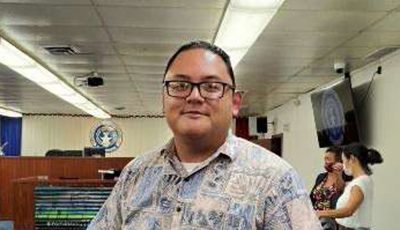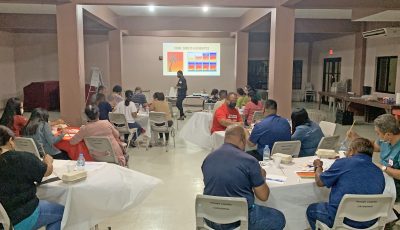IN IMPLEMENTING ALCOHOL, TOBACCO LAWS
‘It’s not personal, it’s the law’

ABTC Officer John Hosono speaks to retailers on the repercussions of not following the law and how to properly check for identification. Chinese and Korean translators look on. (Daisy Demapan)
ABTC director David Maratita and CGC director Nadine Sablan said their agencies have been working collaboratively to reduce the use of alcohol and tobacco products by the youth in the CNMI.
“As part of our efforts to combat the illegal sales of alcohol and tobacco products to minors, our team has been conducting public education and community awareness on Saipan, Tinian, and Rota,” they said.
Although they’ve made progress in past years, bolder and innovative prevention strategies are needed, they said.
Presenters from the tobacco/diabetes prevention and control program as well as the substance abuse prevention program illustrated the dangers associated with substance abuse. “Tobacco is addictive and increases the risk for many diseases. Most individuals who become addicted begin smoking as teenagers. Today, even younger children are chewing betel nut with tobacco,” they said, citing the Youth Risk Behavior Survey conducted by the Public School System.
In 2011 the survey found that 23.9 percent of high school students “had smoked 1 or more cigarettes… and 35.2 percent said they had used smokeless tobacco.” Since then the percentage has been increasing to 65 percent of high school students having tried cigarette smoking in 2013 and 25.1 percent of middle school students and 31.2 percent of high school students having used tobacco for chewing.
The CGC shared that while there are many substance abuse treatment services available, the best way to combat usage is tobacco and alcohol prevention focused on youth.
John Hosono of ABTC enumerated the many responsibilities retailers have in combating the issue of illegal alcohol and tobacco use.
“You can be penalized for providing tobacco products to minors and face up to $1,000 in fines and one year in jail with 250 hours of community service,” he said.
Many Chinese and Korean business owners who were in attendance participated in the workshop with the help of a translator. Hosono said this is another difficulty with combating alcohol and tobacco use by minors.
“I just want you to know that we are peace officers and when we come into your establishment, we just want to make sure you are following the law. If you are selling alcoholic beverages and tobacco, you are required to have the appropriate signage in front of your stores at all times. If we feel the need to further inspect your establishment, you have to comply, you cannot tell us to wait while you call your boss,” he said.
Under Commonwealth Code, Chapter 5 Article 6 5591, inspectors have the right to inspect at all times, without notice, and with immediate access to every part of the premises, including examination of alcoholic beverages, records, transactions, surveillance, including the examination of the manner in which the store conducts business.
Hosono illustrated the misunderstanding of the law with foreign-owned businesses. “If a customer comes to your store and their birthday is three days later, you tell them to come back three days later. If a customer comes into your store to buy alcohol at 9:55pm, stands in line and by the time they make it to the counter it’s 10pm and the transaction takes place just a minute after, if we catch you, that’s already a $1,000 fine,” he said.
Penalties for all violators is a warning letter for the first offense, a $500 fine for the second offense, license suspension for the third offense, and license revocation for up to a year for the fourth offense.
Public Law 17-83, which prohibits alcoholic beverage sales to minors, states that the first offense is a $1,000 fine and 1-year imprisonment with community service, $3,000 and three years imprisonment for the second offense, and $5,000 fine and five years imprisonment for the third offense.
“Those under 21 cannot purchase, possess or consume alcoholic beverages. You must demand ID from all customers purchasing alcohol. There are no exceptions,” he said.
For stores, he said, the legal hours to sell alcohol is from 7am to 10pm and for bars it’s 9am to 2am or up to 4am for a special class 7 license.
“It’s nothing personal…it’s the law, if there’s no ID, there’s no sale and if we catch you, you get fined,” he said.
If you or any person has information of any illegal sales or any person aiding a minor to obtain, possess, or consume alcohol and tobacco products, contact 664-3065 or 323-6560.

























